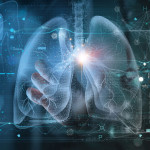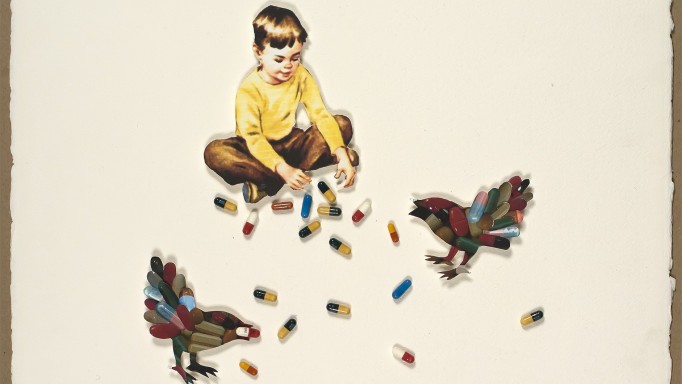Healthy lungs are one of the keys to a good quality of life. Since the advent of effective antiretroviral therapy, people with HIV who stay on treatment and achieve viral suppression are no longer at high risk for AIDS-defining opportunistic infections (OIs) that affect the lungs, such as Pneumocystis pneumonia. However, people with a low CD4 T-cell count remain at risk, and tuberculosis (TB) is the leading cause of death for HIV-positive people worldwide.
Even with good treatment, people living with HIV have higher rates of certain lung diseases, such as chronic obstructive pulmonary disease (COPD), compared with HIV-negative people. COPD, including emphysema and chronic bronchitis, causes blockage of air flow and makes it more difficult to breathe. COPD risk increases with age, and cases are rising among HIV-positive as they live longer. Chronic inflammation and higher rates of smoking may contribute to the elevated risk.
Tobacco smoking also raises the risk for cardiovascular disease, cancer and other health problems. There is less research on cannabis smoking, but any inhaled combustible material can harm the lungs. Unlike some malignancies, the likelihood of developing lung cancer does not appear to be directly related to immune suppression, but some studies have found that lung cancer incidence is higher among people with HIV. Lung cancer is the leading cause of cancer-related death among HIV-positive people, as it is for the general population.
Here are some steps you can take to maintain good lung health.
Smoking cessation. The best thing you can do for your lungs is to stop smoking. Research has found that people living with HIV are more likely to smoke tobacco and less likely to quit than their HIV-negative peers.
Nicotine is addictive, and quitting can be a challenge. Some people find nicotine replacement using gum or patches helpful. Vaping, or inhaling nicotine vapor using an e-cigarette or other device, is less detrimental than smoking, but the inhaled aerosols also contain harmful chemicals. The prescription medications Chantix (varenicline) and Zyban (bupropion) can reduce the urge to smoke. Smoking cessation hotlines, text message services and support groups may also be helpful. Click here for more tips on how to quit smoking.
Many people find that it takes several tries before they quit smoking for good. The sooner you stop smoking, the better, but quitting is beneficial at any age. The health benefits of smoking cessation begin soon after stopping, but the risk for lung cancer remains elevated compared with never smokers. Lung cancer screening with annual CT scans is recommended for longtime heavy smokers starting at age 50, but some research suggests HIV-positive people may benefit from starting sooner.
Aerobic exercise. Physical activity that gets your heart pumping and leaves you short of breath improves overall fitness and can increase lung capacity. This includes brisk walking, running, bicycling, swimming and dancing. Guidelines recommend at least 150 minutes of moderate-intensity activity—ideally 30 minutes on five days—or 75 minutes of vigorous activity per week, along with muscle strengthening exercises. Pick activities you enjoy so you are more likely to stick with them.
Good nutrition. Eating a nutritious diet is important for overall health. Experts recommend including plenty of vegetables, fruits, whole grains and lean protein and limiting ultra-processed foods high in sugar, salt and unhealthy fats.
Vaccines. Viruses, bacteria and fungal infections can cause pneumonia and other lung diseases.Preventive vaccines are recommended for everyone, but they are especially important for people living with HIV.
People with HIV should receive an annual flu shot, with a higher dose for those ages 65 and older; however, HIV-positive people should not get the live nasal spray vaccine (FluMist). People with HIV should also receive COVID-19 vaccines and boosters when they are eligible.
Federal guidelines recommend that HIV-positive adults and adolescents should receive a pneumococcal vaccine to prevent bacterial pneumonia. Options include a single dose of Prevnar 20 (PCV20) or a one-time series of Vaxneuvance (PCV15) and Pneumovax 23 (PPSV23).
OI prevention and treatment. People with a persistently low CD4 count despite antiretroviral treatment—especially if it’s below 200—may need additional medications to prevent or treat opportunistic infections that affect the lungs. Guidelines recommend that all HIV-positive people should be tested for TB at the time of their HIV diagnosis, regardless of risk factors. A skin test can show whether a person has been exposed to Mycobacterium tuberculosis. If so, additional testing is done to see whether they have latent or active disease.
Regular health care. HIV-positive people should receive regular care to manage their HIV and monitor their overall health. Antiretroviral therapy is the best way to keep the virus under control and enable the immune system to recover. Ask your health care team which medications you should take based on your CD4 count and other factors. Minor upper respiratory infections are common and usually nothing to worry about, but contact your health care team if you have difficulty breathing, a persistent cough or other ongoing respiratory symptoms.
Last Reviewed: May 9, 2024














